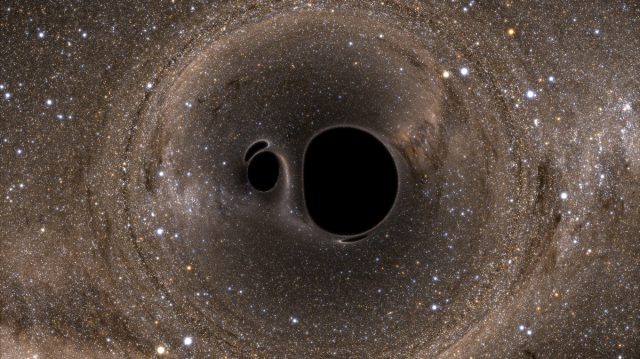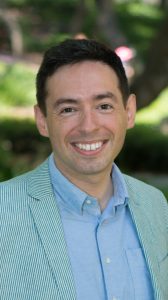
UM physicist Leo Stein has been researching Einstein’s general theory of relativity, using signals from astronomical sources, with the most promising signals being gravitational waves, which are ripples in space and time. Gravitational waves have been detected as the result of the collision of a pair of black holes orbiting each other. Photo illustration courtesy of SXS Lensing, Simulating eXtreme Spacetimes Collaboration
OXFORD, Miss. – A University of Mississippi professor will use his new National Science Foundation award to further explore Albert Einstein’s general theory of relativity and pursue unlocking the universe’s gravitational secrets.
Leo Stein, an assistant professor of physics and astronomy, recently was granted a Faculty Early Career Development Program award from the National Science Foundation.
Known as a CAREER award, the five-year grants are endowed to early-career faculty – assistant professor or equivalent – who show potential to serve as academic role models in research and education and who could lead advances in their institution’s mission.
“It’s wonderful to see recognition and financial support from the NSF, especially at the early career stage,” said Stein, who joined the UM faculty in August 2018. “I think this award should be taken as a signifier that other top experts in the field have deemed this research as interesting and useful.
“Not only does it signify interest at this moment, but also the expectation that our research and our educational program will continue to deliver to our community. This award is not only a five-year grant but also has a goal to lift up faculty to become leaders in the coming decades. I hope I can rise to this challenge.”
Stein’s CAREER award is the university’s sixth in the last six years, including two faculty members receiving CAREER awards in 2019.
“CAREER grants are some of the most prestigious and competitive awards NSF offers, and the university is thrilled for Dr. Stein’s success,” said Josh Gladden, the university’s vice chancellor for research and sponsored programs. “The physics department at UM has a strong history in gravity research and faculty like Dr. Stein ensure it also has a bright future continuing to answer some of the most fundamental questions humans can ask.”
For the last decade, Stein has been researching Einstein’s general theory of relativity, which the physicist published in 1915 and is the best understanding of how gravity works. Stein’s work has been using signals from astronomical sources, with the most promising signals being gravitational waves, which are ripples in space and time.
Predicted by Einstein, gravitational waves were first detected in 2015 by the U.S.-based Laser Interferometer Gravitational-Wave Observatory Scientific Collaboration, which includes Ole Miss researchers, and the European-based Virgo interferometer.
While Einstein’s theory has been successful for more than 100 years and every gravitational phenomenon observed agrees with its predictions, the general theory of relativity recently has shown some vulnerabilities with research into gravity inside a black hole and dark energy, which causes the accelerating expansion of the universe.

Leo Stein, assistant professor of physics and astronomy, has been granted a Faculty Early Career Development Program award from the National Science Foundation. His main research interest is testing general relativity, specifically in the high-curvature regime such as black holes and neutron stars.
“To search for signals of new physics beyond general relativity, researchers need predictions from beyond-general relativity theories, such as the predictions of gravitational waves generated by the merger of two black holes,” Stein said. “While it’s possible to make some progress with pencil and paper, predicting these merger waveforms requires supercomputer simulations.”
The CAREER award will fund Stein’s research into making supercomputer simulations of merging black holes in beyond-general relativity theories possible and more common. He also hopes to overcome a technical hurdle where current simulations only make sense for short periods.
He also will focus on increasing the agreement between gravitational-wave signals observed in nature and the predictions of Einstein’s theory.
“Our tests of beyond-general relativity theories are only as good as the precision of our general relativity simulations,” Stein said. “These simulations have advanced a lot since the first successful one in 2005, but we need to push them further.
“Even though the theory hasn’t changed in over 100 years, we still need to understand it better and nail down more of the details.”
A goal of Stein’s CAREER award research is to be able to predict gravitational waves from black hole mergers in beyond-general relativity theories and to have these predictions be valid for the entire length of time.
“Another goal is to be able to perform a detailed comparison of the simulation output from our collaboration to the outputs from others’ independent codes,” he said. “There are a bunch of technical challenges to doing an honest apples-to-apples comparison that we are working on overcoming.”
As part of his research, Stein will use his CAREER award to invest in the next generation of graduate students and postdoctoral researchers who will become future leaders in the field. Part of the award will help these students and postdocs focus more on their research by providing research assistantships.
“This support enables students and postdocs to present their work at conferences and thus network with other members of their field and to make personal connections, which are important in progressing their scientific careers,” Stein said. “Another important element of every NSF grant is mentoring students and postdocs.
“We want to train them not just with scientific knowledge but also in their career trajectory. It’s not only an investment in science, but in the people who do that science.”
Stein also will use the CAREER award to educate the public and undergraduate students about general relativity and gravitational waves, including creating video and audio interactive tools to introduce and describe these marvels of physics.
Included in this component of the CAREER award is training future researchers and generating materials for public talks by faculty and staff from the UM Department of Physics and Astronomy at Mississippi schools to help recruit students and increase diversity in physics.
The new collection of educational material will not only explain the physics at play but also introduce the mathematical and computational techniques needed to enter the field of gravitational physics.
“There’s a lot of scientific knowledge about general relativity, black holes and gravitational waves that is not easily accessible to the public at large,” Stein said. “I think the concepts themselves can be understood by a broad audience if they are presented graphically and the public can interact with them and build their physical intuition.
“I think that curiosity about how the universe works is fundamental to human nature. This curiosity is what drove the development of our society. Anybody with the curiosity should have access to this knowledge.”
Stein’s NSF award, No. 2047382, is titled “CAREER: Towards Precision Tests of General Relativity with Black Holes and Gravitational Waves.”